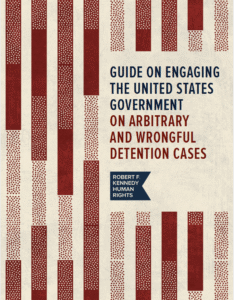Over the course of the last 5 months, the Nigerian authorities have subjected journalist and human rights defender, Omoyele Sowore, to unlawful arrests, arbitrary detention and malicious prosecution due to his attempts to exercise his fundamental rights to freedom of expression and freedom of peaceful assembly. The Nigerian authorities, in particular the Department of State Services (DSS), have repeatedly violated Mr. Sowore’s due process rights and have proceeded to charge him with a number of serious crimes, including cyberstalking, treason and money laundering — none of which have any basis in law or in fact. As a result, Mr. Sowore is now threatened with a sentence of life in prison. To date, the government has failed to produce a single shred of evidence of any wrongdoing for these extremely serious charges, instead the authorities solely rely on Mr. Sowore’s lawful public statements and actions in their attempt to justify his prolonged arbitrary detention and specious prosecution. Mr. Sowore is set to stand trial for these baseless charges on February 11, 2020.
Mr. Sowore is a U.S. permanent resident and resides in Haworth, New Jersey with his wife and two children who are all U.S. citizens. He is the founder of citizen journalist site Sahara Reporters dedicated to exposing corruption and government malfeasance throughout Africa.
CONTACT:
Wade McMullen
Managing Attorney
mcmullen@rfkhumanrights.org
SUPPORT OUR CAUSE SUBSCRIBE TO OUR NEWSLETTERS OVERVIEW OF VIOLATIONS AND IRREGULARITIES IN MR. SOWORE’S CASE
The Rights to Freedom of Expression; to Freedom of Peaceful Assembly; and to be Free from Arbitrary Detention
- Mr. Sowore was illegally detained for 150 days for calling for a nationwide peaceful protest against political corruption and bad governance. The charges brought against Mr. Sowore are without merit and cannot be used as a basis to justify his continued detention.
- Mr. Sowore has been charged under Section 24(1)(b) of the vague 2015 Cybercrimes (Prohibition, Prevention) Act, for, among other things, causing “insult” and “ill-will” to the President during an interview with Arise Television Network. This cybercrime legislation unlawfully restricts the fundamental right to freedom of expression.
- Mr. Sowore is also charged with treasonable felony and conspiracy to commit a treasonable offence for allegedly “conspiring” to stage a revolution with aims of “removing the President.” The specific application of this charge to Mr. Sowore is without merit as his actions do not mirror the charge. Mr. Sowore never called for to use of violence or force, nor for the removal of the sitting president, and the Nigerian government cannot point to any evidence to suggest that Mr. Sowore planned to levy “a war” against the Federal Republic of Nigeria. He has not been found to or accused of training people to overthrow the government, having contact with soldiers or any sort of mobilization necessary to be charged with (let alone convicted of) the crime of treasonable felony of which he is accused.
- Lastly, Mr. Sowore faces four charges of money laundering for transferring funds from his bank accounts to that of the account of Sahara Reporters, his online citizen’s journalism site. The charges state that he transferred funds with the “aim of concealing or disguising the illicit origin of the funds.” This vague charge fails to assert which one of the various crimes Mr. Sowore is supposed to have committed in his transfer of such funds. Section 15(1) enumerates twenty-one crimes that can be associated with the charge of Money Laundering, yet Mr. Sowore’s charging documents fail to list even one crime that his wire transfer is purported to be in furtherance of.
The Right to Be Detained Only with a Judicial Order
- Mr. Sowore’s arrest and subsequent detention were not accompanied by a warrant or judicial order.
The Right to Be Informed of the Reasons for Arrest
- There was no warrant for Mr. Sowore’s arrest and he was detained in DSS custody for three days without being brought before a judge. The Nigerian Department of State Services did not officially charge Mr. Sowore until 48 days after his initial arrest, violating his right to be informed of the reasons of his arrest.
The Right to be Promptly Brought Before a Judge
- The Nigerian authorities failed to bring Mr. Sowore before a judge within 48 hours, as prescribed by the Nigerian constitution and in keeping with international human rights standards. He was held for three days before being presented to a judge and later the Department of State Services sought an ex-parte order to detain Mr. Sowore for an additional 90 days to conduct investigations without charging him. This request was made by invoking an overly broad and vague 2013 anti-terrorism legislation in violation of his rights.
The Right to Release Pending Trial
- The Nigerian government refused to comply with three release orders for Mr. Sowore’s release. Justice Taiwo Taiwo first ordered for the immediate release of Mr. Sowore on September 24 on the condition that he surrender his passport. Two days later, Mr. Sowore met these conditions but the Department of State Services refused to comply with the order and continued to unlawfully detain Mr. Sowore. On October 4 a new judge, Justice Ijeoma Ojukwu, unlawfully set new overly burdensome bail conditions, ignoring the prior release order made by Justice Taiwo Taiwo. On November 4, Mr. Sowore managed to meet all of the bail requirements. Accordingly, on November 6, Justice Ojukwu issued the second order for Mr. Sowore’s release. Despite the second order of release, the DSS again refused to comply and continued to unlawfully detain Mr. Sowore. Mr. Sowore remained in DSS custody until the start of his trial on December 5, 2019. On the first day of his trial, the court ordered for the third time that Mr. Sowore be released. The DSS finally complied with the order, however, less than 24 hours after his release, the DSS violently re-arrested Mr. Sowore when he appeared in court for his second day of trial. The DSS kept Mr. Sowore in their custody for another 18 days before he was finally released on December 24, 2019.
- Throughout Mr. Sowore’s case, the authorities have placed overly burdensome and punitive bail conditions on his release. On October 4, 2019 Justice Ijeoma Ojukwu granted Mr. Sowore bail on the condition that he produce a sum of N100 million naira (about $280,000 United States dollars) and also restricted him from talking to the press engaging in protests and leaving the city of Abuja, even though he has no home in the city. Not only are these overly burdensome conditions vastly disproportionate to the facts of Mr. Sowore’s case, but the impracticality amounts to an effective refusal of bail and de facto order of continued detention.
- On October 21, Justice Ojukwu slightly reduced the financial conditions of Mr. Sowore’s bail but the remaining restrictions remained in place.
- Mr. Sowore was ultimately able to meet the bail requirements on November 4, 2019, however, his movement is restricted to the city of Abuja where he has no residence which effectively amounts to a continued order of detention, in an attempt to keep Mr. Sowore in perpetual custody.
The Right to Have Access to Family
- The Nigerian authorities violated Mr. Sowore’s right to access his family for over 3 months while he remained in their custody. The authorities cut off all phone communication between Mr. Sowore and his wife and children following his wife’s interview media interview on September 4, where she provided information on her husband’s detention and made calls for his release. The couple had no contact between the date of the interview and Mr. Sowore’s eventual release in December.




